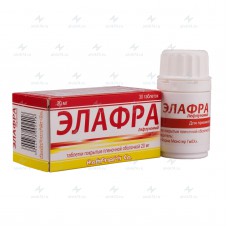Expiration date: 03/2026
Release form
Tablets, film-coated
Composition
1 tablet contains Leflunomide 10 or mg
Packaging
30 PCs.
Pharmacological action
Alara is a basic Antirheumatic drug that modifies the disease, with antiproliferative effects. The active metabolite of Leflunomide - A771726 - inhibits the enzyme dihydroorotatdehydrogenase and has antiproliferative activity. A771726 in vitro inhibits mitogens-induced proliferation and DNA synthesis of T lymphocytes. Antiproliferative activity of A771726 is manifested, apparently, at the level of biosynthesis of pyrimidine, adding in uridine cell culture eliminates the inhibitory effect of metabolite A771726. Nuclear ligands are shown that A771726 selectively binds to enzyme a dehydrogenase dihydroorotate, which explains its ability to inhibit this enzyme and proliferation of lymphocytes in G1 phase. At the same time A771726 inhibits expression of receptors for Il-2 and core antigens Ki-67 and PCNA associated with the cell cycle. Therapeutic effect of Leflunomide was shown in several experimental models of autoimmune diseases, including rheumatoid arthritis.
Testimony
The active form of rheumatoid arthritis.
Contraindications
Hypersensitivity, liver dysfunction, severe immunodeficiency, significant violations of bone marrow hematopoiesis or anemia, leukopenia or thrombocytopenia, severe uncontrolled infection, renal failure, hypoproteinemia, pregnancy, lactation, age under 18 years old.
Method of application and doses
Treatment leflunomida start with a single oral loading dose of 100 mg for 3 days. As a maintenance dose recommended ingestion of 10 mg to 20 mg of Leflunomide once a day 1. The therapeutic effect usually manifests after 4-6 weeks and can grow up to 4-6 months. Does not require any dose adjustment for patients older than 65 years. Tablets should be swallowed whole, squeezed enough liquid.
Side effects
The most common adverse effects (1-10%): leukopenia, allergic reactions, loss of appetite, weight loss (usually insignificant), fatigue (weakness), headache, dizziness, paresthesia, moderate increase in blood pressure, diarrhea, nausea, vomiting, erosive-ulcerative lesions of the mucous membrane of the mouth, abdominal pain, increased liver samples, increased hair loss, eczema, dry skin, rash, itching, tenosynovitis, increase of certain enzymes in the blood (creatine phosphokinase).
Atypical side effects (0.1-1%): decrease in the number of red blood cells, thrombocytopenia, a decrease in the level of potassium in the blood, anxiety, impaired taste sensation, hives, increased blood fat levels (cholesterol and triglycerides), the level of phosphate in the blood.
Rare side effects (0.01-0.1%): eosinophilia, leukopenia, pancytopenia, sharp increase in AD, dysfunction of the liver in the form of hepatitis, cholestasis, jaundice, sepsis (possibly fatal).
Very rare side effects (0.001% or less): agranulocytosis, severe allergic reactions, Stevens-Johnson syndrome, toxic epidermal necrolysis, erythema multiforme, vasculitis, peripheral neuropathy, pancreatitis.
Special instructions
The drug may be administered to patients only after a thorough medical examination. It is recommended to refrain from drinking alcohol. Full blood count should be carried out before starting treatment and every 2 weeks during the first 6 months of treatment and every 8 weeks after completion of treatment. In the case of hematological reactions, including pancytopenia, you must stop taking the drug and any concomitant drug to suppress bone marrow hematopoiesis, and to start the procedure "laundering". The transition to another basis of the drug without the procedure "laundering" may increase the possibility of additional risk even long after the transition. In the case of ulcerative stomatitis should stop taking Leflunomide. In case of skin and/or mucosal reactions, you should discontinue drug treatment and to start the procedure "laundering". Monitor patients with tuberculin reactivity due to the risk of reactivation of tuberculosis. Before treatment with Leflunomide and periodically after it has started, you should control blood pressure. It is not recommended during treatment take cholestyramine or activated charcoal. The drug should not assign pregnant women or women of childbearing age who do not use reliable contraceptives in the treatment with Leflunomide and for some time after this treatment. The procedure "laundering": after stopping treatment with Leflunomide: Cholestyramine 8 g injected 3 times a day for 11 days. Alternatively, 50 g of activated charcoal, crushed into powder, is injected 4 times daily for 11 days. Regardless of the selected washing procedure, it is necessary to verify two separate tests at an interval of at least 14 days and to wait for 1.5 month from the moment when the concentration of the drug in plasma for the first time will be recorded below 0.02 mg/l prior to fertilization. Women of childbearing age must remember that it takes 2 years after stopping treatment with Leflunomide, before they will be able to get pregnant. Cholestyramine and activated charcoal may influence the absorption of estrogen and progesterone in such a way that oral contraceptives do not give 100% guarantee. It is recommended to use alternative methods of contraception.
Drug interactions
There is no information regarding the joint use of Leflunomide with antimalarials used in rheumatology administered intramuscular or oral gold preparations, D-penicillamine, azathioprine and other immunosuppressive agents (with the exception of methotrexate). No known risk associated with the assignment of combination therapy, especially with prolonged treatment. Increase the side effects can be in the case of recent or concomitant use of hepatotoxic or hematotoxic drugs.
Overdose
In case of overdose or toxicity, it is recommended to take cholestyramine or activated charcoal.
Storage conditions
The drug should be stored out of reach of children, dry, protected from light place, at temperature not above 25°C.
Shelf life
3 years.


